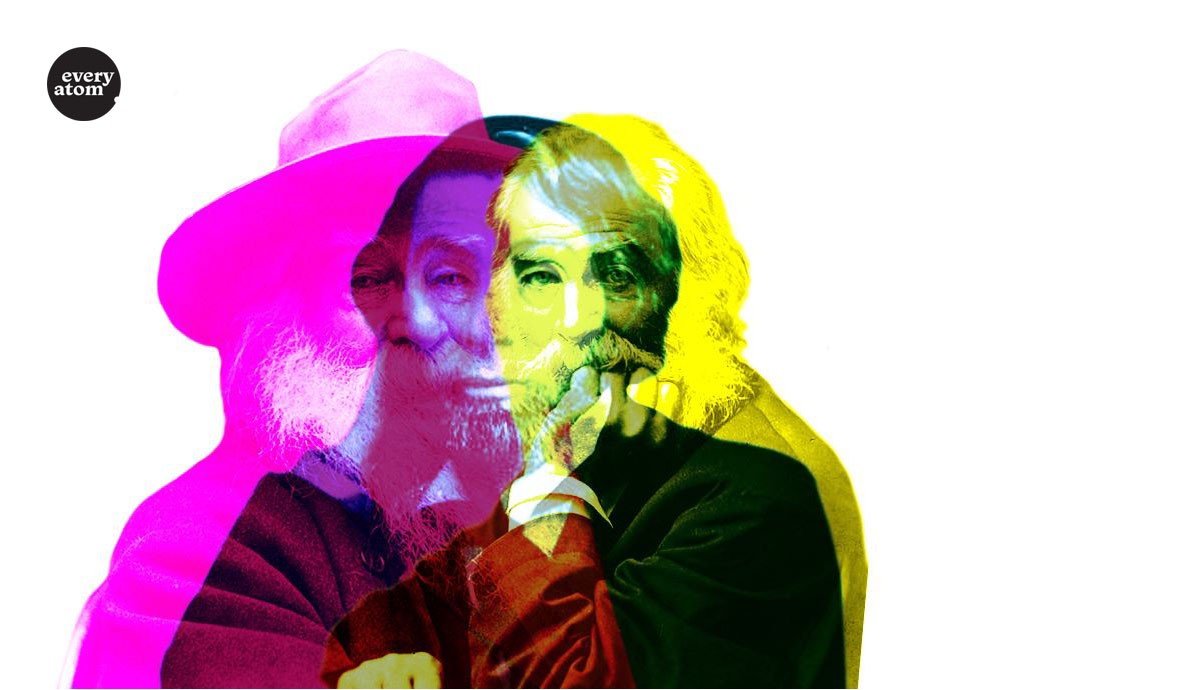Every Atom | No. 132
Introduction to Every Atom by project curator Brian Clements
For Walt Whitman to sing the song of [him]self and for us to care means that he has to sing of the same self as yours and mine. I think of this as exemplifying Kapwa—the Filipino indigenous trait of interconnection of all beings across all time. Kapwa is the most significant influence on my poetry. In several poetics essays, I’ve presented it along the lines of
There’s an image from pre-colonial Philippine times of a human standing with a hand lifted upwards; if you happened to be at a certain distance from the human and took a snapshot, it would look like the human was touching the sky. Filipino novelist N. V. M. Gonzalez mythologizes this human as a creature who, by being rooted onto the planet but also touching the sky, is connected to everything in the universe and across all time, including that the human is rooted to the past and future—indeed, there is no unfolding of time. In that moment, all of existence—past, present and future—has coalesced into a singular moment, a single gem with an infinite expanse. This is the space in which I strive to write poems, thus my calling Kapwa (partly) a “poetics.” In my poetry, I strive in part to explore/reveal the interconnection of all beings and things—through poetry, I wish for no one or nothing to be alien to me.
—from “Murder death resurrection: Another way for poetry,” Jacket2’s “Extreme Texts” 2019 Feature edited by Divya Victor
Many lines in “Song of Myself” evoke Kapwa; here’s some that show the notion not to be an abstraction or intellectualization:
The runaway slave came to my house and stopped outside,
I heard his motions crackling the twigs of the woodpile,
Through the swung half-door of the kitchen I saw him limpsy and weak,
And went where he sat on a log and led him in and assured him,
And brought water and fill’d a tub for his sweated body and bruis’d feet,
And gave him a room that enter’d from my own, and gave him some coarse clean clothes,
And remember perfectly well his revolving eyes and his awkwardness,
And remember putting plasters on the galls of his neck and ankles;
He staid with me a week before he was recuperated and pass’d north,
I had him sit next me at table
I also much appreciate how Whitman addresses time:
I have heard what the talkers were talking, the talk of the beginning and the end,
But I do not talk of the beginning or the end.
I’ve just finished a novel that incorporates what I call “Kapwa-time” where there is no past, present, or future—where all is now. I believe Kapwa cannot exist if one disregards the past or future as one navigates the present.
As such, I’m happy to celebrate Whitman’s appropriately ambitious song of self—the poem doesn’t just present that self as not separate from mine but that that self’s contexts are not different from mine (without being mired in reductiveness as regards specific circumstances, e.g. the poem’s address of slavery). His song is a unifying force by diluting that other-ing gaze:
You shall no longer take things at second or third hand
Recommended
Nor’easter
Post-Op Appointment With My Father
Cedar Valley Youth Poet Laureate | Fall 2024 Workshop







